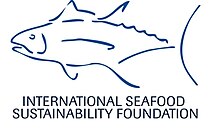International Seafood Sustainability Foundation
 |
|
| Headquarters | McLean, VA |
|---|---|
|
Membership
|
World Wildlife Fund |
|
President
|
Susan Jackson |
| Website | |
World Wildlife Fund
Asian Group
Bolton Alimentari
Bumble Bee Foods
Chicken of the Sea International
Chotiwat Manufacturing Company
Clover Leaf Seafoods
Conservas Garavilla, S.A.
Dongwon
FRINSA
Jealsa Rianxeira S. A.
MPP Trading
MW Brands
Negocios Industriales Real NIRSA S.A.
Pataya Foods
Princes
R.S. Cannery
Salica
Sea Value Company
StarKist Company
Thai Union Manufacturing Company
TriMarine International
International Seafood Sustainability Foundation (ISSF) was formed in 2009 as a global, non-profit partnership among the tuna industry, scientists and World Wide Fund for Nature. The group states its mission is to undertake science-based initiatives for the long-term conservation and sustainable use of tuna stocks, reducing bycatch and promoting ecosystem health. Regional Fisheries Management Organizations (RFMOs) are primarily responsible for managing the world’s tuna stocks—skipjack, yellowfin and albacore tuna, the species most commonly processed for canned and shelf-stable tuna products, but their parliamentary procedures too often allow the short-term economic and political interests of nations to prevent sustainable measures from being adopted. ISSF works to ensure that effective international management practices are in place to maintain the health of all the tuna stocks.
While ISSF is not generally involved in the bluefin segment of the industry, which primarily supplies the sashimi market, the board has enacted a statement of concern urging the adoption of policies supporting proper management of bluefin in the Atlantic – one of the most threatened of all tuna stocks, and they now include bluefin populations in their Status of the Stocks Reports.
The ISSF provides regional fisheries management organizations with scientific recommendations to help promote tuna fishing practices that keep oceans (and tuna stocks such as skipjack tuna, albacore tuna, and yellowfin tuna) productive and healthy. In addition the ISSF helps nations combat and monitor illegal and unregulated fishing, a global problem that can damage marine ecosystems and endanger future fish stocks.
ISSF adopted conservation measures under its principle of governance:
Work with RFMOs to achieve their objectives of conservation of tuna stocks and their ecosystems;
Employ sound science for maximum sustainable yields of targeted tuna stocks;
Strive to eliminate illegal, unregulated, and unreported tuna catching;
Provide for the health and care of the marine ecosystem;
Facilitate use of the precautionary approach;
Minimize by-catch, discards, and abandoned gear;
Collect and exchange data to promote better scientific understanding of tuna stocks;
Support certification programs that meet the 2005 eco-labeling guidelines of the United Nations Food and Agriculture Organization.
...
Wikipedia
